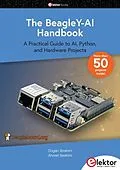Welcome to your BeagleY-AI journey! This compact, powerful, and affordable single-board computer is perfect for developers and hobbyists. With its dedicated 4 TOPS AI co-processor and a 1.4GHz Quad-core Cortex-A53 CPU, the BeagleY-AI is equipped to handle both AI applications and real-time I/O tasks. Powered by the Texas Instruments AM67A processor, it offers DSPs, a 3D graphics unit, and video accelerators. Inside this handbook, you'll find over 50 hands-on projects that cover a wide range of topics-from basic circuits with LEDs and sensors to an AI-driven project. Each project is written in Python 3 and includes detailed explanations and full program listings to guide you. Whether you're a beginner or more advanced, you can follow these projects as they are or modify them to fit your own creative ideas. What yoüll be working on Here's a glimpse of some exciting projects included in this handbook: > Morse Code Exerciser with LED or Buzzer Type a message and watch it come to life as an LED or buzzer translates your text into Morse code. > Ultrasonic Distance Measurement Use an ultrasonic sensor to measure distances and display the result in real time. > Environmental Data Display & Visualization Collect temperature, pressure, and humidity readings from the BME280 sensor, and display or plot them on a graphical interface. > SPI - Voltmeter with ADC Learn how to measure voltage using an external ADC and display the results on your BeagleY-AI. > GPS Coordinates Display Track your location with a GPS module and view geographic coordinates on your screen. > BeagleY-AI and Raspberry Pi 4 Communication Discover how to make your BeagleY-AI and Raspberry Pi communicate over a serial link and exchange data. > AI-Driven Object Detection with TensorFlow Lite Set up and run an object detection model using TensorFlow Lite on the BeagleY-AI platform, with complete hardware and software details provided.
Autorentext
Prof. Dr. Dogan Ibrahim holds a BSc degree in Electronic Engineering, an MSc degree in Automatic Control Engineering, and a PhD in Digital Signal Processing. He has worked in numerous industrial organizations before returning to academic life. Prof. Ibrahim is the author of over 60 technical books and over 200 technical articles on microcontrollers, microprocessors, and related fields. He is a Chartered Electrical Engineer and a Fellow of the Institution of Engineering and Technology.
Ahmet Ibrahim obtained his BSc degree from the University of Greenwich in London, where he also completed an MSc course. Ahmet has worked at various industrial organizations at different levels and is currently working in a large organization in the IT field. He is the author of several technical books and articles.
